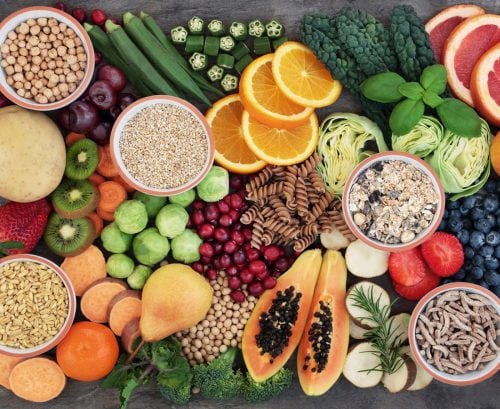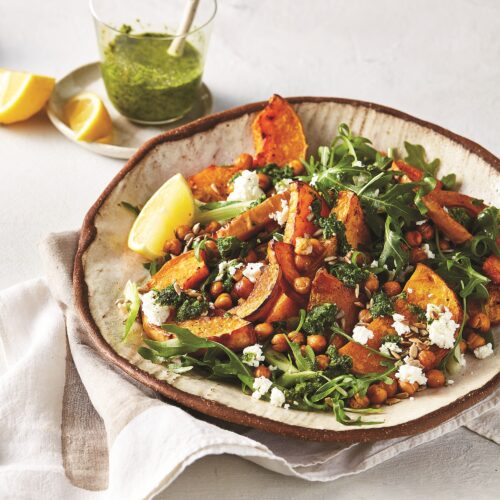
Bowel cancer is the second highest cause of cancer death in New Zealand, with more than 3000 new cases confirmed each year. HFG shares the stats you need to know.
17%
That’s how much you could cut your risk of bowel cancer — by eating three serves of whole grains each day. Simple swaps, such as eating brown grainy bread instead of white bread, brown rice instead of white rice, and rolled oats instead of refined breakfast cereals, make all the difference.
50 years
The age after which your risk of developing bowel cancer increases significantly. Other risk factors include a family history of the disease, a previous occurrence of bowel cancer, a history of polyps, an inflammatory bowel condition such as Crohn’s disease, increased insulin levels or type 2 diabetes. If you’re 50-plus, talk to your GP about testing for bowel cancer.
2
The maximum number of standard drinks consumed each day that is considered ‘low risk’ for the general population, along with at least two alcohol-free days per week. Studies have linked even light drinking to an increased risk of bowel cancer — so put simply, the more you drink, the greater your risk.
28-38 grams
The amount of fibre to aim for each day as part of a healthy, balanced diet. Fibre not only adds bulk to stools and guards against constipation, it promotes the growth of healthy bacteria in the bowel. Include plenty of whole grains, legumes, fruit, vegetables, nuts and seeds for your daily fibre fix.
1 in 18
The number of New Zealanders who will likely be diagnosed with bowel cancer in their lifetime. Unfortunately, many people who are diagnosed with bowel cancer have few symptoms. The good news is that if found early, nine out of 10 bowel cancer cases can be successfully treated.
300+
Kiwis aged under 50 are diagnosed with bowel cancer each year. So if you have symptoms, such as blood in your bowel motion or an abnormal pattern of going to the toilet that lasts for several weeks, don’t think you’re too young; see your GP about getting tested.
3-4
The maximum number of occasions each week we want to eat red meat such as beef, lamb or pork. Blackened meat is also of concern — so before you fire up the barbecue, marinate your meat to minimise charring. Also aim to minimise or avoid eating processed meats such as bacon, salami or ham, as there is strong evidence that consumption of these foods increases our risk of developing bowel cancer.
150-300 minutes
The amount of time to spend each week doing moderate physical activity. Anything from Pilates to Zumba or tai chi counts, so find something you enjoy that raises your heart rate — and stick to it! Not only will you improve your fitness and boost your metabolism, you’ll cut your risk of bowel cancer.
Bowel cancer: the facts
- New Zealand and Australia have the highest rates of bowel cancer worldwide
- Over 1200 Kiwis die each year from bowel cancer – that’s 23 a week
- 90 per cent of bowel cancer cases can be successfully treated if detected early
- Most cases of bowel cancer occur in people over the age of 50, but the cancer can affect anyone
- Being overweight, a heavy drinker or a smoker raises bowel cancer risk
- Eating a healthy diet, being physically active and having a healthy body weight cuts bowel cancer risk.
Article sources and references
- Bowel Cancer New Zealand, bowelcancernz.org Accessed May 2019https://bowelcancernz.org.nz/
- Ministry of Health. Bowel cancer, health.govt.nz Accessed May 2019https://www.health.govt.nz/your-health/conditions-and-treatments/diseases-and-illnesses/bowel-cancer
- Robertson L et al. 2017. Bowel cancer screening . New Zealand Medical Journal 130:1461https://www.nzma.org.nz/journal/read-the-journal/all-issues/2010-2019/2017/vol-130-no-1461-1-september-2017/7356
- World Cancer Research Find and American institute for Cancer Research. 2017. Continuous Update Project: Diet, Nutrition, Physical Activity and Colorectal Cancer. Revised 2018, wcrf.orghttps://www.aicr.org/continuous-update-project/reports/colorectal-cancer-2017-report.pdf
www.healthyfood.com











